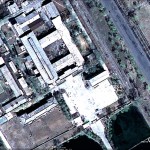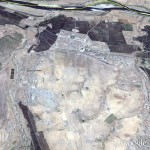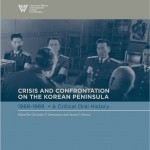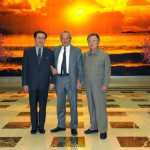Pictured above: Nampho Glass Bottle Factory visited by Kim Jong-il
Institute for Far Eastern Studies (IFES)
(NK Brief No. 11-01-26)
1/26/2011
According to North Korean media, Kim Jong Il began this year’s onsite instruction with a visit to the Nampo Glass Bottle Factory. The January 20th issue of the Choson Sinbo also ran an editorial stating that “These days, in our country, improving the lives of the people is especially emphasized.” It also noted that Kim Jong Il’s first onsite visit of the year was to a site important to improving people’s standard of living. The paper boasted that great efforts were being made in the development of light industry — especially factories producing daily-use goods and food products — and revealed that the bottle factory in Nampo will play an important role in meeting the increased countrywide demands for packaging from factories large and small.
Despite this praise, the reality is that the people of North Korea are suffering ever-worsening economic conditions. Just as South Korea is in the middle of a cold spell, the North has suffered chilling conditions ever since the end of December. The Korean Central News Agency reported on January 22, “The cold-weather conditions are expected to continue until the end of January,” and, “this cold spell is causing more than a little damage to the lives of the people and to spring farming preparations.”
As the cold spell drags on, their hardship will continue. North Korea is ill-prepared to deal with such cold weather; freezing pipes make it difficult for the people to access fresh water, while food and firewood are in short supply. Hunger and cold are exacerbated this winter because those without access to firewood or heating oil are also faced with an environment devoid of wild plants or animals.
Power shortages have also grown more severe in the new year. On January 20, Open Radio for North Korea (ORNK) reported that an area of the Yanggang Province has been without electricity since the first of the month. Even Pyongyang has been experiencing power difficulties, with electricity only available to most residents for 1~2 hours each day. ORNK reported that “recently in North Korea, students and parents have been burdened with supplying firewood for school heating, while the prices of coal and wood are skyrocketing in the markets.”
The cost of food has also shot through the roof. Rice, corn, pork, and other staple foods are becoming increasingly more expensive. Young-wha Lee, a spokesperson for the Japanese human rights organization Rescue the North Korean People! Urgent Action Network (RENK), announced on January 17 that a source inside North Korea had reported a 500 Won jump in the price of rice within Pyongyang, from 1,400 Won per kilogram on the January 7 to 1,900 Won within 3~4 days. Corn jumped from 750 to 950 Won, and pork was up from just under 4,000 Won to its current price at around 5,000 Won. Gasoline now costs 3,500 Won.
According to a South Korean online source for news on North Korea, Daily NK, one can see the impact of inflation by taking notice of the price gap of around 200 Won per kilogram of rice in Pyongyang and rice in rural areas (North Pyongan Province’s Sinuiju and Ryanggang Province’s Hyesan, in particular). It is noteworthy that prices are shooting up in January, rather than during the lean season of March and April.
Good Friends, a South Korean-based humanitarian organization, has also relayed reports of inflation from sources within North Korea. It has reported that rice was selling in Pyongyang for as much as 2,100 Won per kilogram on January 7, significantly more than the 1,600 Won per kilogram reported at the end of last year. Prices continued to hover around 2,000 Won until recent rations eased shortages and brought the price back down to around 1,500 Won. As North Korean organizations and social units distribute these overdue holiday rations, there has been a fall in food prices.
However, these rations were not seen in all areas of the North, and in those regions where residents were not provided food, prices remain high. Rice in Hamheung jumped from 1,500 Won per kilogram on January 1 to 1,800 Won just one week later. On January 7, similar prices were seen in Chongjin (1,750 Won) and Sinuiju (1,800 Won). Ten days later, rice in Chongjin had climbed to 1,980 Won, and was threatening to break the 2,000 Won barrier. Corn in Pyongyang was selling for 950 Won per kilogram on January 7, while it cost 780 Won in Chongjin and 850 Won in Hamheung, Sinuiju, and Pyongsong. By January 17, corn averaged between 750 and 800 Won. Only in Pyongyang, agricultural regions, and other areas receiving rations had prices fallen to 600 Won per kilogram.
According Good Friends, grain prices in the North have shot up this year because several Party officials in charge of grain imports are behind schedule with incoming shipments, and the rising value of the US dollar and Chinese yuan have driven up the cost of overseas purchases.




